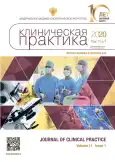Creating a public mutation database oncoBRCA: bioinformatic problems and solutions
- Authors: Nikitin A.G.1, Brovkina O.I.1, Khodyrev D.S.1, Gusev O.A.2,3, Gordiev M.G.4
-
Affiliations:
- Federal Scientific and Clinical Center of Specialized Types of Medical Care and Medical Technologies of the Federal Medical and Biological Agency of Russia
- Kazan’ (Volga region) Federal University
- Institute of Physical and Chemical Research RIKEN
- National BioService
- Issue: Vol 11, No 1 (2020)
- Pages: 21-29
- Section: Basic Science
- URL: https://journal-vniispk.ru/clinpractice/article/view/25860
- DOI: https://doi.org/10.17816/clinpract25860
- ID: 25860
Cite item
Full Text
Abstract
Background. The development of hereditary cancer syndromes is caused by genetic disorders in the DNA repair system, which consists of more than 100 genes. However, at present, in the majority of medical centers in Russia, the diagnosis of hereditary OC and BC is limited to the determination of the most frequent mutations (8 points) in BRCA1 and BRCA2 genes using PCR methods. However, the given mutations are frequent for Slavic population while in other populations of Russia they occur less often or do not occur at all. Aim. To reveal the landscape of hereditary pathogenic variants in the genes of the reparation system and develop methods for a fast analysis of the NGS data.
Methods. A panel of 34 genes of the reparation system was analyzed by next generation sequencing (NGS) in 1644 samples of patients with inherited cancer syndromes.
Results. The NGS analysis revealed 119 pathogenic mutations of BRCA1/BRCA2 genes in 374 patients, with a marked difference in mutation frequencies between different ethnic groups — Slavs, Tatars, Bashkirs and Chuvash. A public database of the frequencies of mutations and polymorphisms of the genes of the DNA reparation system in different ethnoses was created at https://oncobrca.ru. Methods were created for automatic parallel processing of any number of samples from the raw data to the final report.
Conclusions. The NGS method has created a possibility to identify rare mutations characteristic of different ethnic groups, which makes it possible to prescribe optimal chemotherapy and develop diagnostic methods of population screening for carrying gene mutations of the DNA repair system. The modern approaches to the analysis of genome sequencing data allowed reducing the time of obtaining the result to several hours after the analysis.
Full Text
##article.viewOnOriginalSite##About the authors
A. G. Nikitin
Federal Scientific and Clinical Center of Specialized Types of Medical Care and Medical Technologies of the Federal Medical and Biological Agency of Russia
Author for correspondence.
Email: avialn@gmail.com
ORCID iD: 0000-0001-9762-3383
к. биол. н., заведующий лабораторией генетики
Russian Federation, MoscowO. I. Brovkina
Federal Scientific and Clinical Center of Specialized Types of Medical Care and Medical Technologies of the Federal Medical and Biological Agency of Russia
Email: brov.olia@gmail.com
ORCID iD: 0000-0002-0946-7331
SPIN-code: 3631-1397
к. биол. н., старший научный сотрудник
Russian Federation, MoscowD. S. Khodyrev
Federal Scientific and Clinical Center of Specialized Types of Medical Care and Medical Technologies of the Federal Medical and Biological Agency of Russia
Email: dmkh008@gmail.com
SPIN-code: 4292-7072
к.биол.н., старший научный сотрудник
Russian Federation, MoscowOleg Alexandrovich Gusev
Kazan’ (Volga region) Federal University; Institute of Physical and Chemical Research RIKEN
Email: gaijin.ru@gmail.com
ORCID iD: 0000-0002-6203-9758
SPIN-code: 5666-3711
к.биол.н., заведующий лабораторией экстремальной биологии; научный сотрудник
Russian Federation, Kazan; Yokohama, Kanagawa PrefectureM. G. Gordiev
National BioService
Email: marat7925@gmail.com
SPIN-code: 8388-3566
директор по медицинской генетике
Russian Federation, Saint-PetersburgReferences
- Torre LA, Bray F, Siegel RL, et al. Global cancer statistics, 2012. CA Cancer J Clin. 2015;65(2):87–108. doi: 10.3322/caac.21262.
- Sokolenko AP, Iyevleva AG, Mitiushkina NV, et al. Hereditary Breast-Ovarian Cancer Syndrome in Russia. Acta Naturae. 2010;2(4):31–35.
- Foretova L, Machackova E, Navratilova M, et al. BRCA1 and BRCA2 mutations in women with familial or early-onset breast/ovarian cancer in the Czech Republic. Hum Mutat. 2004;23(4):397–398. doi: 10.1002/humu.9226.
- Хасанова А.И., Гордиев М.Г., Ратнер Е.Ю., и др. BRCA-ассоциированный рак молочной железы у представительниц татарской национальности на примере клинического случая // Приволжский онкологический вестник. — 2016. — №2. — С. 104–108. [Khasanova AI, Gordiev MG, Ratner EYu, et al. Clinical report of BRCA-associated breast cancer among representative of the tatar nationality group. Privolzhskiy onkologicheskiy vestnik. 2016;(2):104–108. (In Russ).]
- Fackenthal JD, Olopade OI. Breast cancer risk associated with BRCA1 and BRCA2 in diverse populations. Nat Rev Cancer. 2007;7(12):937–948. doi: 10.1038/nrc2054.
- Matsuda S. Defective DNA repair systems and the development of breast and prostate cancer (Review). Int J Oncol. 2013;42(1):29–34. doi: 10.3892/ijo.2012.1696.
- Zook JM, McDaniel J, Olson ND, et al. An open resource for accurately benchmarking small variant and reference calls. Nat Biotechnol. 2019;37(5):561–566. doi: 10.1038/s41587-019-0074-6
- Miller NA, Farrow EG, Gibson M, et al. A 26-hour system of highly sensitive whole genome sequencing for emergency management of genetic diseases. Genome Med. 2015;7:100. doi: 10.1186/s13073-015-0221-8.
- Chen J, Li X, Zhong H, et al. Systematic comparison of germline variant calling pipelines cross multiple next-generation sequencers. Sci Rep. 2019;9(1):1–13. doi: 10.1038/s41598-019-45835-3.
- Van der Auwera GA, Carneiro MO, Hartl C, et al. From FastQ data to high confidence variant calls: the Genome Analysis Toolkit best practices pipeline. Curr Protoc Bioinformatics. 2013;43:11.10.1–11.10.33. doi: 10.1002/0471250953.bi1110s43.
Supplementary files







